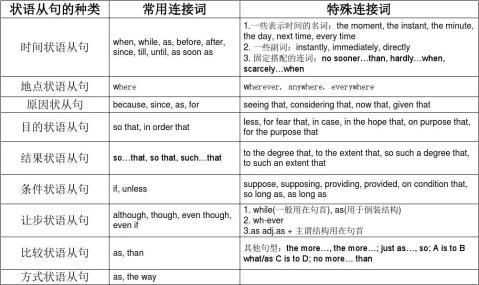篇一 :让步状语从句用法归纳
SDN让步状语从句
让步状语从句是状语从句中的一种,其本身也是状语从句。一般翻译为“尽管……”或“即使……”,就是我们日常生活中用的“退一步说……”的感觉。
引导让步状语从句的连词主要有以下这些:though,although,while,as; even if,even though; whether...or...; no matter+疑问词,疑问词-ever,regardless of+名词/名词短语/名词从句,despite,in spite of。切记although,though 不可与but连用,但可以与still和yet连用。
⑴though,although表示“虽然,纵然”之意。
这两个连词意思大致相同,在一般情况下可以互换使用。在口语中,though较常使用,although比though正式,二者都可与yet,still或never,the less连用,但不能与but连用。例如:
My will remains firm though I must lower my physical sights.
尽管我得降低体育(锻炼)的目标,但我的意志是坚强的。
…… …… 余下全文
篇二 :英语 让步状语从句用法总结
英语 让步状语从句用法总结(一)
让步状语从句的用法一(表示“虽然,即使,尽管”)
1. although,though,even though,even if都表示“虽然,即使,尽管”之意,though 和although 语气较弱(其中的though 比although 通俗, 不如although 正式),even if和even though 带有强调意味而显得语气更强。例如:Although they are poor, they are happy. 虽然他们很穷,但很快乐。// Although it was so cold, he went out without an overcoat. 天气虽然很冷, 但他没有穿大衣就出去了。// Though they may not succeed, they will still try. 即使他们可能不会成功,但他们仍努力尝试。// The article is very important though it is short. 那篇文章虽然很短,但很重要。// He is better, though not yet cured. 他好一点了,虽仍未痊愈。// Even though it was raining, she walked to work. 即使下雨,她也是走着去工作的。// I’ll visit him this evening even if I can stay only a few minutes. 今晚我将去拜访他,即使我只能停留一小会儿。
…… …… 余下全文
篇三 :让步状语从句用法归纳
让步状语从句
让步状语从句是状语从句中的一种,其本身也是状语从句。一般翻译为“尽管……”或“即使……”,就是我们日常生活中用的“退一步说……”的感觉。
引导让步状语从句的连词主要有以下这些:though,although,while,as; even if,even though; whether...or...; no matter+疑问词,疑问词-ever,regardless of+名词/名词短语/名词从句,despite,in spite of。切记although,though 不可与but连用,但可以与still和yet连用。
⑴though,although表示“虽然,纵然”之意。
这两个连词意思大致相同,在一般情况下可以互换使用。在口语中,though较常使用,although比though正式,二者都可与yet,still或never,the less连用,但不能与but连用。例如: My will remains firm though I must lower my physical sights.
尽管我得降低体育(锻炼)的目标,但我的意志是坚强的。
Though I believe it,yet I must consider.
…… …… 余下全文
篇四 :初中英语知识点总结:让步和比较状语从句
一、让步状语从句
所谓让步,就是我们日常生活中“退一步说……”的意思,有一种转折关系在里面。引导让步状语从句的连词主要有以下这些:though, although,while, as; even if, even though; whether...or...; no matter+疑问词,疑问词-ever,一般翻译为“尽管……”或“即使……”,“无论……”。用法如下:
1、though, although表示“虽然,纵然”之意。这两个连词意思大致相同,在一般情况下可以互换使用。在口语中,though较常使用,although比though正式,二者都可与yet, still或never,the less连用,但不能与but连用。例如:
Although/Though he is very old, (yet) he is quite strong. 他虽然年纪大了,身体还很健壮。 值得注意的是,although引导的让步状语从句位于主句之前的情况较多,though引导的让步状语从句可位于主句之前或主句之后。
2、as,though表示“虽然……但是”,“纵使……”之意。as引导的让步状语从句必须以部分倒装的形式出现,被倒装的部分可以是表语、状语或动词原形,though也可用于这样的结构中,但although不可以这样用。例如:
…… …… 余下全文
篇五 :20xx-11-29 检测题 让步状语从句总结
请根据下列所给的单词翻译下列句子
1,尽管我们很穷,但是我们很开心。(Though)
_____________________________________________________________________ 写出同义句(用however)
_____________________________________________________________________ 写出同义句(用as)
_____________________________________________________________________ 2, 无论我们在哪,我们都不能忘记我们的祖国。(wherever)
_____________________________________________________________________ 同义句:
_____________________________________________________________________ 3, 不管你来与不来,我们都不介意。(whether)
_____________________________________________________________________ 4, 我们都不应该放弃,尽管我们还会继续犯错。(even if和even though 二选一) _____________________________________________________________________
…… …… 余下全文
篇六 :状语从句用法总结(完整)
状语从句
什么是状语?
状语修饰动词、形容词、副词或整个句子。
1. Naturally, our grandparents were pleased to get our phone call.
2. We worked hard, from sunrise to sunset.
3. To help my disabled aunt, I spend an hour working in her house every day 4. Seen from a distance, the farmhouse looked deserted.
5. I know how to light a camp fire because I had done it before. 状语的位置比较灵活,可以位于句首、句末或句中。
什么是状语从句?
状语从句指句子用作状语时,起副词作用的句子。它可以修饰谓语、非谓语动词、定语、状语或整个句子。状语从句一般由连词(从属连词)引导,也可以由词组引起。 根据其作用状语从句可分为:
1.时间状语从句
2.地点状语从句
3.原因状语从句
…… …… 余下全文
篇七 :状语从句总结
引导条件状语从句的连接词主要有:if(如果)、unless(除非)或 as long as(只要)等。unless在意思上等于if...not。
一、条件状语从句用法
1、引导条件状语从句最常用的连词是if,由if引导的条件状语从句表示在某种条件下某事很可能发生。如:
If you ask him, he will help you.如果你请他帮忙,他会帮你的。
If you fail in the exam, you will let him down.如果你不及格,你会让他失望的。 另外,if从句还表示不可实现的条件或根本不可能存在的条件,也就是一种虚拟的条件或假设,从句多用一般过去时或过去完成时。如: If I were you, I would invite him to the party.如果我是你,我会邀请他参加聚会。
2、unless = if...not. 除非,若不,除非在……的时候
例如:Let's go out for a walk unless you are too tired.
=If you are not too tired, let's go out for a walk.
…… …… 余下全文
篇八 :状语从句 总结

…… …… 余下全文